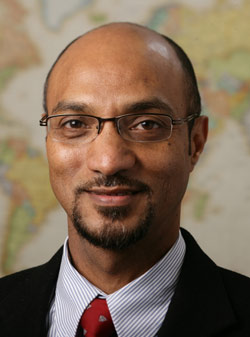
As the people of Libya celebrate their liberation from four decades of dictatorship, oppression and killings at the hands of Muammar Gaddafi, Rashied Omar, research scholar of Islamic studies and peacebuilding at the University of Notre Dame’s Kroc Institute for International Peace Studies, advises, “Let us not become as dehumanized as Gaddafi.”
“It is understandable that four decades of oppression and the killings of innocents have generated mass rage and hatred for Gaddafi, but there is a clear Islamic ethic of dealing with one’s enemies,” Omar says. “The Qur’an teaches us that we should not allow our enmity or hatred for others to make us swerve away from justice. The exact circumstances of the killing of Gaddafi are still unclear with conflicting accounts of his death emerging. However, no matter how atrocious Gaddafi’s actions were and the decades of suffering he caused his own people, we should not condone acts of revenge, especially when motivated by anger and rage. We must always be cautious not to become as dehumanized as those we accuse of committing atrocities against us.
“When the great Libyan anti-colonial liberation fighter, Omar Mukhtar, protected two surviving Italian prisoners, saying ‘We do not kill prisoners,’" Omar continues, “his fellow warrior said ‘They do it to us.’ Omar Mukhtar responded with these majestic words: ‘They are not our teachers.’”
Omar’s research and teaching focus on religion, violence and peacebuilding, especially the Islamic ethics of war and peace and inter-religious dialogue. He spends half of each year at Notre Dame and the other half serving as the coordinating imam at the Claremont Main Road Mosque in Cape Town, South Africa. He also is an international trustee emeritus of the Council for a Parliament of the World’s Religions.
As a young man, Omar was jailed as a student activist against apartheid. Since then, he says, “My struggle has been how to build a bridge between my faith commitment and my participation in protest against racism and apartheid.” As an imam in Cape Town, before and after the transition to democracy, he has insisted on being part of civil society, separate from the state, and on speaking truth to power and not being part of any political party.
Omar is featured in Notre Dame’s current “What Would You Fight For?” ad, “Fighting for Peace Among Religions.”